
How poor decision cause an adverse effect in your workplace

A poor decision can adversely affect work productivity in the workplace. A poor decision in the workplace can get reworked with meditation and calculated thoughts on a decision to be implemented.
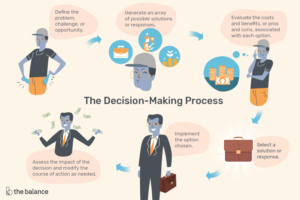
Decision Making is one of the crucial roles every employer should play. You will have a lot of people from team advisers to individual departments within your firm. They can give you various information and advice you of your options. But even in that context, the ultimate decision will come down to you. You will be responsible for setting every major directive and making every important call when charting the course of your business. While it can be intimidating, you can grow to become more skilled at it.
Decision making is like any other skill. When you first engage, you will be inexperienced. As a result, your performance will suffer. But if you can slowly eliminate your bad habits and replace them with positive practices, you will set yourself up for much greater overall success.
Given below are some of the worst decision-making habits. If you see them growing in yourself on the poor decision in the workplace, take proactive measures to get rid of them:
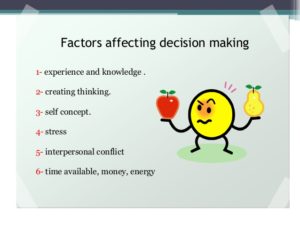
Poor decision-making habit that can affect your business badly
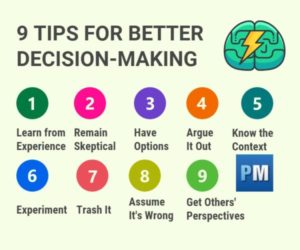
- Not doing the research
You should do thorough research before every practical decision you make. It is from selecting the target audience of your business to hiring a new employee. The amount of effort and time you spend on research should be directly proportional to the scale of the decision. Company-altering decisions will need greater research effort than deciding where to go to lunch with a potential new client.
Still, there are numerous factors you will always want to research before landing on one side or the other. It includes the current environment, the potential costs, the potential risks, and the potential outcomes. Also, check what type of outcomes have arisen as a result of similar decisions in the past. Once you have all the data in front of you, you will be able to make a much more informed decision.
- Going on instinct
Some business owners have forged a leadership position based on charisma and intuition. They are likely becoming entrepreneurs because one day, they simply felt like doing it. They plunged in headfirst because it seemed like a good thing to do.
These types of business owners generally have a great spirit. But they don’t last long in their role as they lack grounding. Even more tactical, logical entrepreneurs suffer from the “instinct” problem sometimes. In some cases, your gut instinct can aid you to decide between two relatively comparable options, relying on logic and sound advice is. But in the long term, the better strategy.
- Waiting too long
Some entrepreneurs face difficult decisions by detaining them for as long as possible. For example, if an employer is considering firing an employee, he may postpone the decision because it’s a difficult decision. Over time, he may get more information that can make his decision easier. However, a toxic employee who gets fired three months from now rather than today will cause three months of extra damage to your firm.
It is inadvisable to make prompt decisions, but it’s even worse to procrastinate on decisions that need to be made with relative haste. In most cases, a non-ideal choice is better than no decision at all.
- Relying on others
As a business head or leader, you should be open to opinions. You should listen to your investors, your mentors, your partners, your employees, and even your family and friends when weighing your options for serious decisions. However, you should never rely on others opinions to make your own decisions.
Never find yourself asking for someone’s opinion and then coming up with a decision immediately after. It could be a clue that you are over-relying on outside advice. It is your business, and you need to make your own decisions for it.
- Avoiding pain
There are several painful decisions you’ll have to make as an entrepreneur. You’ll have to fire people. You’ll have to break partnerships. You’ll have to give up on products. You’ll have to make significant financial cuts.
New entrepreneurs often make specific decisions that avoid short-term pain. They may opt to keep circulating a product that isn’t performing well to avoid admitting to the loss. Eluding short-term pain is never a good idea. In most cases, short-term pain must be withstood to guarantee long-term outcomes.
You should not vote “Good” decisions and “bad” decisions based on their final results. Instead, the quality of a decision should get defined based on the amount of effort the decider put forth in making the decision. Under these definitions, a “bad” decision may end up with a good result, and a “good” decision ends up with a bad result. However, over time, “good” decisions will always defeat “bad” decisions. So, it pays to eliminate these bad practices and consistently follow a sound decision-making process.

How ethics and social responsibility fundamentals for business?
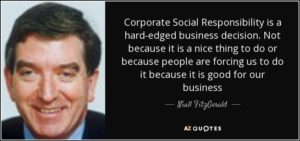
How ethics and social responsibility fundamentals for business? Social responsibility for business is imperative for business in the long run with a vision on sustainability.

Ethics is not always black and white, and the ethical decision is not always clear to all. Even leaders can fail to act all the time ethically. It will cause a greater impact on the company’s reputation. It is one of the most critical assets, which is hard to rebuild once you lost it. If you are looking to start up a company that is ethically sound right from the ground up. Creating an ethical organisation will put you on the right path.

What are business ethics and social responsibility for business?

Business Ethics is a moral guideline. It is for the efficient running of the business based on what is right, wrong and fair. Most of employers rely on their own morals in making business decisions. They fall back upon their moral and religious backgrounds for guidance. However, they also get useful advice and information from their managers and immediate colleagues.
Employers may feel pressurised to behave unethically when seeking to make profits. Over recent years many firms and industries have strived to develop codes of conduct. It can be used to guide managers when making decisions.
The importance of business ethics to a firm
Working as an ethical company has many benefits. It can attract and keep investors, employees and customers. Let your investors know that your firm’s morals and promise to work ethically and responsibly. It provides them with peace of mind that their money is being used in a way that aligns with their moral standing. When working for a company with firm business ethics, employees are satisfied. They grasp that any of their action or inaction isn’t allowing any unethical practices to continue. Customers are at ease of buying products or services from your firm. They know how to source their materials and labour ethically and responsibly.
For example, a coffee-making company states all their raw beans are picked from sustainable plants. There is no deforestation has happened. People are getting paid a good living wage. In their area, investments have been made to ensure that producing coffee for a foreign market has not injured the local way of life. All these are the elements of their buying strategy. It becomes themselves a selling point for their final product.
A firm, which sets out to work within its own ethical guidelines is less at risk of being fined for poor behaviour. They will be less likely to find themselves in breach of one of the multitudes of laws concerning required behaviour. For example, there are laws around payments to corrupt regimes, or environmental practice policies. The whole company can get fined, and the directors can get penalised. The individual employees can be fined if the responsibility for an infraction falls on their shoulders.

How business ethics can cause a bad impact to the Wider World
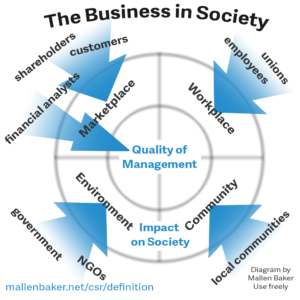
Firms that are not following business ethics or ignoring their social responsibility drives to wider outcomes. The natural world can get affected by a lack of Business Ethics. For example,
- A firm which shows no care for where it disposes its waste products.
- A business which fails to take a long term view when buying up land for development.
- Or a company neglects its duties towards reducing its carbon footprint and advance green renewable energy.
They are damaging the world in which every human being lives. They are ruining the future prospects of all companies.
So, a business philosophy should stress the need for firms to behave as good corporate citizens. Instead of just obeying the law, every firm should conduct their production and marketing activities in the right manner. They should strictly avoid causing environmental pollution or exhausting finite world resources. Some companies have begun to behave in a more socially responsible way. It may partly because their managers want to do so. Or it may partly because of fear of environmentalist and consumer pressure groups and the media. They will also concern for their public image. It is argued that socially responsible behaviour can pay off in the long run, even if it involves some short-term sacrifice of profit.
Ethical practices can go beyond just ensuring your business does not harm people and the environment. It also means dedicating a share of your firm’s time and resources to actively updating these areas. For example,
- Investing in community programs,
- Investing in building in developing countries,
- Lobbying for political change,
- Supporting your employees to donate their time and expertise to other projects.
This level of business ethics is the most praiseworthy, which is something all companies strive for these days. It allows you to achieve higher standards for all in the future.

How to resolve conflicts between employees?
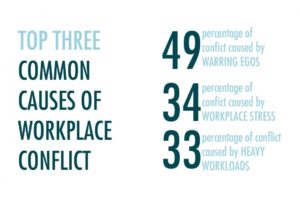
Conflicts between employees will create friction in the interpersonal relationship. Conflicts between employees will lead to a loss in productivity and the spread of negativity in the employee zone.

When you have a group of people together day after day, conflict is inevitable. The employees you so carefully screened during interviews aren’t immune, either. They might have had the right answers to behavioural questions such as, “How do you manage conflict?” Unfortunately, polished interview responses don’t secure a harmonious workplace.
Workplace conflict can occur in different ways: between two employees, among whole teams or between managers and the team members they manage. The issue might seem difficult in the first place, but resolving them is possible.
However, it’s time to resolve the conflict effectively so that you can refocus on growing your business. We know it sounds overwhelming because it seems to be outside of the business scope to deal with people fighting. But, the truth is that acquiring conflict management skills and strategies to be applied in the workplace. It is an indicator of a great business leader. When there are a large number of people from different backgrounds, disputes and quarrels will arise, and you better be prepared.
Don’t worry. We are here for you!
We have gathered tested methods and designed a course of action with simple steps to show you how to handle conflict in the workplace.
Let’s dig in.
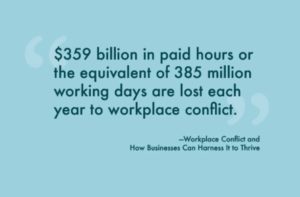
How to handle conflicts between employees?

- Embrace conflict.
When a conflict arises, don’t avoid it or pretend nothing has occurred. As time goes on, tension will mount, and the battle only will get worse. Deal with these uncomfortable matters as soon as possible, before more problems, and bad feelings become embedded in daily work.
The time you notice a conflict between team members, encourage them to find a way to work it out. In case a dispute develops between two teams, it’s an excellent time to improve interdepartmental communication. If you have a fight with one of your employee, address it head-on and in private.
- Talk together.
Set up a time and place so that you can talk for an extended span without outside interruptions.
When you meet, each person should have adequate time to say what he or she believes the other party needs to heed. Don’t let any individual monopolize the discussion or control the topic. Each person should talk only about the differences and how he or she feels about the issue.
Remember, it is not the time to attack or assign blame. So, focus on the problem, not your opinion of the other person’s character.
- Listen carefully.
It’s essential to give your undivided attention to the person who is talking. Do not interrupt the other person.
Make sure you are getting the message he or she intends to send. Rephrase and repeat back what you have heard to confirm understanding.
Ask clarifying questions if needed. You can also request the other person to repeat a central idea or reword his stress in a way that makes sense.
Listening should be about gaining understanding. Don’t permit yourself to become reactionary to the other person’s words.
- Find agreement.
Your discussion mainly will centre on the differences, but the resolution is possible only when you locate points of agreement. You need to emerge from the experience with some positives rather than all negatives.
Shed light on commonalities. Share examples of situations in which you agree with the other person or can see any other point of view. For example, if you don’t agree on new sales tactics, you might share what you liked about the other person’s idea. You can also motivate the team to work harder.
Looking for agreement exhibit your willingness to seek out common ground and build a relationship around those trust elements.
- Provide guidance.
If you are in a leadership position, there are times you may need to mediate work disputes. Don’t take sides, ever. Realize you are there to help your employees work out their problems.
You might need to guide the conversation. And if hurt feelings run high, you’ll likely need to redirect the topic, so your employees return to the real problem. If you’re in a position to advise on next steps, highlight the positive features of the process. You can also suggest them related topics or actions they can work through after the meeting.
- Be quick to forgive.
Every conflict needs a fair resolution that acknowledges hurt feelings and finds a solution that mends them.
Apologize. Tell the other person you are truly sorry for any wrong words or actions from your side. You will also need to forgive the other person. Agreeing only for the sake of appearances can lead to grudges that deepen over time, undoing any progress you’ve made together.
The truth is that, at last, we all want to be happy and productive. Another truth is that the majority of us do not want to deal with confrontation, especially at work. It is not a task to avoid, though. When handling employee conflict, remember that everybody responds better to understanding than to criticism and judgment. With that in mind, next time, your employees start fighting, just listen, understand, change, and move on. Create a culture of understanding in your firm, and you may witness productivity miracles!

How to ensure better discipline in your workplace?
Discipline in your workplace brings aims and achievement closer.
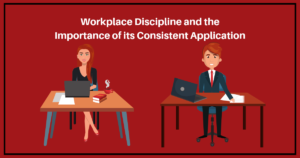
“Discipline in your workplace is choosing between what you want now and what you want most.”
— Abraham Lincoln
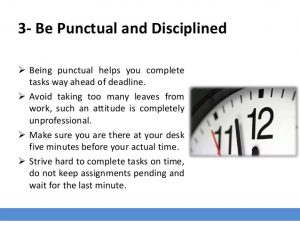
Every business needs to climb the right rung of the ladder to success. It can happen only if you develop a strong discipline and positive work ethic in your office. Creating a disciplined workplace culture or to enure discipline in your workplace is not easy always. You don’t want to become too strict or demanding. It is not a positive approach.
Here are specific ways in which you can develop better discipline in your office while maintaining the respect of employees.
“Discipline in your workplace is the bridge between goals and accomplishment.”
— Jim Rohn
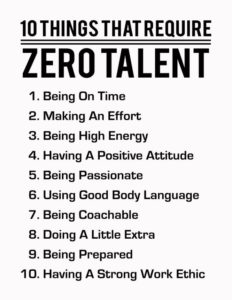
How to develop better discipline in your workplace?

- Be a good leader
Are you the head of the business? Then, it’s your responsibility to act as a leader for the rest of your workforce. Many people are afraid to serve as a leader. They think that it is better to let the employees organise themselves. But most workforces prefers to have someone who can lead them efficiently.
It is not about yelling at people and telling them what to do. It is more about encouragement and helping them to reach their full potential. You can offer guidance when people aren’t sure what the best approach should be.
A leader is a person who pulls everyone in the same direction and resolves disputes calmly.
- Remove distractions
Sometimes, ill-discipline is more to do with people not focusing on the job in hand and instead of being distracted. You should remove all those things from the office that can be a distraction for your people.
These potential distractions could be to do with how the workspace is organised. Or it could be to do with the technology that they are using. It is a good idea to block social media sites in the office because these can act as major distractions for employees.
When people are too busy on their social media sites, they don’t do the tasks that you want them to do. Banning sites might seem harsh in the first place. But it might be necessary.
- Make a pleasant working place
Another thing you can do is improving your workspace. The office should not be a place where people hate being each day. Your employees should walk into the workspace looking forward to what the day has to offer them.
If they are walking in and feeling like they would rather be somewhere else, then you will find it hard to develop a disciplined and productive office space. So, brighten up the office and change how it operates.
You should make it more collaborative so that working for the business is a bit more fun than it was before. It is a relatively small change, but it could make the office a much nicer place to be for your employees.
- Think about the age of the workforce
It is something that many employers don’t even think about. But having a young team means you have to approach the problem differently than the workforce with older ones. You need to tailor your plan to your employees depending on what they respond best to.
Think about their age and personalities. Then, personalise your approach to office discipline. Most people respond better to gentle encouragement and a relaxed approach. And others need a firmer approach to behave in a way that is appropriate for your office. A uniform approach to discipline isn’t always the best option to go for.
“Without self-discipline, success is impossible, period.”
— Lou Holtz
- Make the rules clear
If you want your workforce to follow the rules, they should know exactly what those rules are. You can’t expect your people to follow the rules if you haven’t mentioned to them what they are. So, you should decide what the rules are, to begin with. It is not something that you need to spend too long doing. You should have fewer precise rules. It is much better than having a million rules that no one is going to bother to read.
The rules of your company should ideally fit on one side of the paper. If you are easily accessible to commercial laminating machines, you can print and produce a few copies of the rules. You can exhibit it in the office so everyone can see them.
- Put a three-strikes rule in place
You must have some real consequences for people who deny playing by the rules inside the office.
It makes no sense to follow the rules in place if nothing happens when someone breaks those rules, does it? The best thing to do is to put a three-strike rule in place. It would mean that an employee would be given some warnings before they finally get fired for poor discipline.
Having this kind of procedure will make it clear to everyone what their limits are. People will think twice before doing things that disrupt if they know that there will be consequences of their actions.
- Give people space to work
As an employer, you don’t want to be breathing down the neck of your people all day long. If they feel like they are under pressure to do something, they will be much less likely to do it well. That’s why it is so important to give your people the space they need to work in their own way.
No two people are the same. And they should get the space to build an approach to their task that they are comfortable with. If you aspire to get the most out of employees, you should allow them this kind of independence.
- Prioritise communication with employees
You can create a disciplined office only if you are prepared to keep the lines of communication with your employees open. Employees should feel like they can communicate with you and air their worries as they arise.
This type of communicative culture is a very healthy thing to have. So, never underrate how important it can be. It can turn out to be one of the most powerful things about your entire business. But first of all, you need to make it very clear to everyone that you are willing to listen to them whenever they have something important to share.
“One of the most important keys to success is having the discipline to do what you know you should do, even when you don’t feel like doing it.”
— Unknown

Job interviews during the deadly coronavirus pandemic

Job interviews during the deadly coronavirus epidemic. A remote Job interview during coronavirus pandemic is the best option for overall safety for all involved.
The victims of the novel coronavirus pandemic are increasing after each passing day. It leads most companies around the world, asking their employees working from home. It avoids the commute to the office and the victim’s interaction with other employees, which slow the spread. As a result, recruiters and managers are getting forced to move their hiring processes online. Job interviews during the deadly coronavirus pandemic are mostly remote.
The most immediate change will likely be companies switching in-person interviews to online interviews through video calls. While the core of those interviews is ultimately the same, video interviews differ from in-person meetings. You may have a lot of questions in your mind, including:
- What are the best practices for video interviews?
- What job may seekers encounter over the next few weeks?

Let us dive into the blog to know more about Job interviews on a coronavirus pandemic.

- What you should expect
Companies are always proud when they can fill positions quickly. They may be less bothered about that measure during the coronavirus pandemic, though. In other words, firms may take longer to make you an offer, especially for senior-level positions.
It would be shocking if someone made an offer to a senior candidate without meeting the person. But in this situation, we got no other options than getting the person through several interviews rounds until they can meet the person. Another issue is that it’s likely more challenging to get all the key stakeholders to weigh in on a candidate to make a decision.
If everyone is going out of the office, working remotely and not meeting regularly may be arduous to get everyone on the same page.
While nobody wants to take part in lengthy hiring processes, you need to remember that we are currently dealing with unprecedented circumstances. If you want to land a job, you will need to continue engaging with these processes, no matter how long it takes to get considered for roles.
- Do a thorough research
Fortunately, the first move in preparing for video interviews is not associated with what you did before the beginning of the epidemic. The key is to do as much homework and research ahead of an interview as possible.
During your research, it’s essential to find potential topics of conversation with interviewer or interviewers. Video interviews tend to involve less small talk and be shorter than in-person meetings. So, it is even more vital that you make an effort to form a bond with the recruiter on the other side of the screen. For example, you can look for things to talk about on the interviewer’s LinkedIn profile. Or, you can mention anything they said on a podcast or anywhere else.
- Prepare your space and practice
Unlike in-person interviews, video interview often opens a window into your personal life. As a human, we make decisions about what people’s spaces or homes look like. You shouldn’t let hiring managers see a messy surrounding piled up with mountains of waste papers or crooked picture frames.
Instead of it, opt for a neutral background with good lighting. Also, ensure the camera is at eye level to avoid any unflattering angles.
One of the benefits to video interviews is that you can have notes in front of you or around your workplace. The person doesn’t have to know about that. Moreover, if you have dual monitors, you can keep one for the interview and the other one for your notes.
For you don’t have a proper space or a laptop with a built-in camera, local libraries can often be a one-stop-shop for your job hunt. They may even have a peaceful space for you to sit with your laptop for the interview. Alternatively, you can ask any local co-working spaces if they have a room and equipment to rent.
Lastly, you will want to practice talking to the camera, which is more complicated than it seems. You can put a pair of googly eyes right near the camera lens. It encourages you to look at the camera during the interview session. Never look down, off to the side or elsewhere. You have to ensure you have good eye contact.
- During the interview
While many of the in-person or video job interview questions will be the same, you should ask for specific information about the firms hiring timeline. You should also ask if the position will be remote until the outbreak is over and how the firm will proceed with the onboarding process if they continue to work remotely for a month or two.
It’s also crucial during a video interview to tell the recruiter how interested you are in the opportunity. You should thank him for their time to interview you. Tell them how impressed you are with the team and say how honoured you are to get considered for the position. Never leave any doubt in his mind that you want to be there.
Additionally, you should expect the unexpected during these next few weeks while people are working from home. While everyone will want to continue with their professional tasks, life can sometimes get in the way when children, pets or even the doorbell intrude on a video interview. The best thing you can do is showing grace and hope they will return the favour.
The Bottom line
The coronavirus is shaking up how recruiters operate. The recruiters and companies are moving job interviews to video. In some ways, the switch has made their jobs easier since many of their clients are working from home. Instead of waiting to hear back from people who may be at meetings or walking around the office, the clients are at home and available to talk when needed. The downside is that a face-to-face meeting is still needed to secure larger positions, meaning recruiters may need to wait to cash in on fees until the outbreak is over.

Here are the brilliant tips for dealing with a demanding boss

Here are the brilliant tips for dealing with a demanding boss. Ways and means to deal with a demanding boss in the workplace.

Who else wants to learn about the brilliant tips for dealing with a difficult or demanding boss? It is rare to have a perfectly ideal manager. Certain characteristics may indicate you are dealing with a truly toxic boss. If you see any traits in your boss, your the response from you may be to ignore it. But you can grapple with a deadly situation for so long before it starts to harm your well-being.
Although bad bosses can impact you negatively, they are not inherently stressful. Instead, your internal response to him or her is what dictates how you feel. You should survive and even thrive in a toxic state by reframing the situation. View the elevated stress and pressure as an opportunity for growth.
Here are five ways of coping with a toxic boss can affect your mental and physical health and how to overcome them.
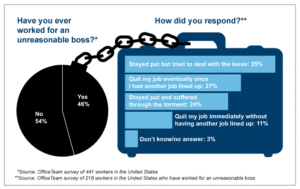
How to overcome the mental and physical health issues a demanding boss gives you?
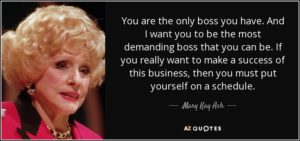
- Fear and anxiety
A toxic boss introduces dread and worries into your life and the office. They may instil the fear of being singled out or targeted, the fear of being ridiculed by colleagues or the fear that your career will be ruined.
Working in a continuous state of fear is hugely damaging. It may leave you feeling incapacitated. Studies show that anxiety can impair your decision-making. It breeds uncertainty and leaves you vulnerable to making impulsive reactions.
Solution: There are many ways to tackle fear. If you are scared of failing in your career, identify the things you can control. It will let you stop focusing on the life happenings you don’t have any control over.
- Mental fatigue
Chronic exposure to a poisonous boss has a profound influence on well-being. Your efforts to get by from day to day are downright exhausting.
This daily stress and pressure can lead to mental fatigue. It impairs your cognitive performance and lessens your motivation to get things done. Mental stress or fatigue also makes it harder to focus on tasks at hand. It results in decreased productivity and works efficiency.
Solution: For overcoming mental fatigue, you should stay calm. To get to this state, you should do things that make you feel positive. Detach from work when you are not working and remember the big picture.
- Boredom
Life with a toxic boss can make you feel stagnant, especially if he is passing you over for promotions or piling mundane tasks on your desk.
That boredom can quickly drain your willpower and motivation. It can also diminish self-care and resilience. In fact, boredom can make you less focused at work and decreases your level of engagement. It can also lead to career-sabotage. Bored employees are more susceptible to abusing their colleagues and purposely failing at tasks.
Solution: Rather than viewing boredom as a hindrance, use it to spark your next innovative idea. When you are bored, your brain goes into a default mode. It allows to connect ideas, set goals and figure out what steps we need to take to reach them.
- Sleep
Proper rest is necessary for your well-being. It plays a significant role in defining your success level. Dealing with a toxic boss can hugely disrupt your ability to enjoy restorative sleep. So, poor sleep quickly and ruthlessly saps our ability to be your best self and to respond to the toxicity more effectively.
Your clarity, perspective and judgement suffer when you don’t get enough shut-eye. Also, sleep deprivation can limit your capability to respond to complex challenges within a firm.
Solution: When your work is keeping you up late at night, try these sleep expert-approved hacks. It will help you doze off. Read a book or colour, schedule 10 minutes of “worry time” earlier in the day or practise yoga before bed.
- Loneliness
Humans are social creatures by nature. We need some baseline community and contact to live and perform at our peak.
But you may find yourself shut out by colleagues quickly. They will fear that a connection to you will result in the same treatment from the boss. It can lead to feelings of loneliness. It can accelerate cognitive decline, poor sleep patterns and increased levels of stress hormones.
Solution: Cultivating workspace relationships is a crucial factor in career growth and promotion. So, practice humility and gratitude to form lasting professional bonds with your co-workers. Become an active listener and observer and plan an informal meet-n-greet.


How to deal with backstabbing colleagues
How to deal with backstabbing colleagues. Backstabbing colleagues are there everywhere in the workplace. Ways and means to deal with a toxic colleague who is backstabbing.

The co-worker takes the credit for your work. The manager forgot to invite you to a meeting — but blames you. The office gossip lets it slip that you came to work hangover.

Sound familiar? Then the chances are you are dealing with an office backstabber.
Holding onto a job right now is very tough. Mix in a backstabbing colleague, and it could get even tougher.
Making friends in the office is a great idea, as long as they are people you can trust and respect. When you can’t get along or have an uneasy feeling about a co-worker or a group of them, it can make an already busy schedule more stressful.
What can you do if you feel an office backstabber is hurting you or others? How can you identify the office snake?
- They will be the one who is seeking to undermine and sabotage you, your reputation and your career at every turn.
- He will be the one who is spreading rumours about you.
- She or he will be the one putting you down to your boss behind your back.
- They will be the one stealing credit for your ideas
How can you deal with the situation before it gets out of control? Here is how to stop the damage without becoming a part of the problem.

How to stop backstabbing colleagues before the situation gets out of control?

- Keep yourself cool
You may want to hit back once you have been bombed with backstabbing, but this reaction may produce an unwanted cycle of events. Backstabbers aren’t going just to let retaliation go. While it is tempting to get back at that person, resist the urge to engage in their games.
- Call out bad behaviour without being confrontational or defensive
You may feel the instinct to avoid the person and create a safe distance. Even though our gut instinct to stay away from them, that usually doesn’t work. So, ask the backstabber to validate their behaviour. Be objective and say you have observed particular action, such as cutting you off during meetings and ask why.
- Write it all down
Don’t just run to your boss with your woes and start babbling. Have concrete, written proof that a colleague is being dishonest or trying to paint you in a negative light. While you may feel difficult to wait as you gather information, you will be far more effective when you present your case to the employer.
- Keep your reliable friends close to you and your enemies closer
It may sound counterintuitive, but an increased interaction with the peer is more helpful than less. The goal is to see if you can deescalate the tension so that you won’t end up wanting to bring in the big guns. By extending an olive branch, you may be able to solve problems on your own.
Getting to know a person will help you to build a bridge and convert the relationship. It is a lot harder to backstab someone you know about and like than a stranger.
- Enlist backup
You are not likely the only person that the backstabber has hurt. So, understand who you can trust and ask them to back you up. Workspace allies can also help you build your case to present to the management. So, consider meeting with trusted colleagues and coming up with a strategy to explain why and how the office troublemaker needs to get stopped.
Most importantly, never sink yourself to the level of the problem making person. And don’t lie or exaggerate about the issues, alone or as a group. Remember that the backstabber, however terrible, is a human. Neutralizing disputes is most successful if you can hang on to your empathy and honesty along the way.


What are the best and healthy ways to reduce office stress and frustration?

What are the best and healthy ways to reduce office stress and frustration? Reduce office tension and frustration with the best know techniques accustomed by prosperous men.
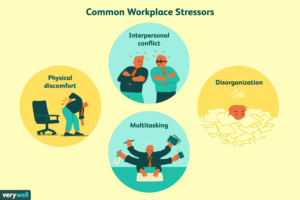
Everyone around the world gets frustrated from time to time, especially in the office environment with high-pressure. Many people hide or suppress their emotions, which isn’t healthy. It could ultimately cause your emotions to boil over spectacularly, ruining your reputation within your organisation. You must be able to release frustration, especially at work.
Instead of letting your emotions control you, it’s essential to manage and healthily release them. Most people in the workspace think about time management when trying to achieve a healthy work-life balance. However, there is also an emotional component that you should address when considering how work influences your overall wellness, productivity, and quality of life.
Here are a few healthy ways to deal with your emotions on those days you feel overwhelmed with frustration.
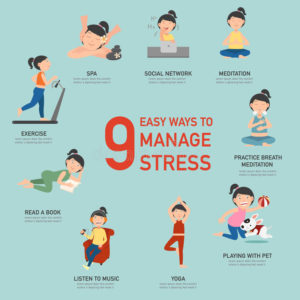
Healthy ways reduce office stress and frustration

- Face Your Frustration
The first and foremost step in releasing anger or frustration is to acknowledge it and observe it. The root cause of your frustration isn’t going to disappear magically, and it’s essential to face your frustration so that you can do something about it. Understanding how and why you get anger or frustration can help you deal with the emotion and even prevent it in some cases.
Thinking critically about an emotion, you are probably not proud of is difficult. But analysing the situations that cause you frustration is key to controlling your emotions in a healthy way over the long term. And always remember to take a moment to collect yourself before you respond to a frustrating situation. It will hold you from saying something you will regret later.
- Give Yourself a Break
We are all hard on ourselves. We think that we need to become perfect, even-tempered robots who never get frustrated, angry, or sad at work. Can you imagine how boring that could be?
Give yourself a break. You are not perfect, and neither are your colleagues. Don’t beat yourself up for getting frustrated sometimes. It’s just human nature. Just learn how to prevent it when you can and release it in a healthy way when you can’t. You will feel much better than if you expect perfection from yourself.
- Tend to Your Mind, Body, and Soul
You may consider self-care as something that happens outside the office premise, but that isn’t the case. It’s a good idea to have some go-to practices you can use to overcome stress and calm down when you feel frustrated at work.
Meditation, breathing and mindfulness exercises, and desk yoga are all great options for in-office wellness. You don’t have to spend hours in a quiet room to tend to your mind, body, and soul. Even just a few moments of stretches or deep breathing can help you calm down, get some perspective, and release tension.
- Get Comfortable
How is your desk set up at the office? Do you have an uncomfortable chair or a desk that isn’t quite the right height? If so, you may be physically uncomfortable, which doesn’t help when you’re feeling frustrated. If you can, try upgrading to a more comfortable chair. Invest in some noise-cancelling headphones if the ambient noises in the environment are adding to your frustration.
- Manage Your Workload
Going above and beyond may seem like a great idea at the moment, but in reality, it’s not good for anyone involved. If you take on more than you should, you may start to feel bitter, resentful, and frustrated, or at least overwhelmed. That added stress can make you feel frustrated and make you less productive overall.
You might think that taking on extra work is a great way to gain your boss’s approval. But if you burn yourself out and become frustrated consistently, you’re likely to have trouble managing your workload, and your emotions could boil over. Learn the power of saying “no” at the right time, and you will be able to manage your emotions more effectively.
You Need to Let the Frustration Out!
It’s important to reduce office stress and frustration as it occurs. Failure to do so could drive to changes in your mood and attitude that might impact your job performance and well-being. Letting frustration and resentment build can also lead to unhealthy habits such as gambling, alcohol and drug abuse or other dangerous behaviours.
Frustration is an alluring emotion that’s fuelled by entitlement or self-righteousness. Whether or you are justified in your frustration in any given situation or not, it’s crucial to deal with the emotion and let it out in a proper way. If you don’t, you’re only hurting yourself!


Here are the quick tips on how to handle a remote workforce during coronavirus outbreak
Managing a remote workforce during coronavirus outbreak is quite a task to be taken on the event of the coronavirus pandemic.
Managing a remote workforce during coronavirus outbreak with the best methods can effectively improve better productivity in a concern.

The novel coronavirus is spreading abundantly after each passing day. It leads many companies to ask their employees to work from home. It is an effort to slow down the spreading and preserve the health and safety of their people. This change created a new set of challenges for managers as they need to support and stays connected with their new remote workforce. If you are also one among those managers, here are a few tips to help you.

How to effectively manage a remote workforce during coronavirus outbreak?

- Establish a remote leadership team
Shifting an entire division or a company can trigger a shockwave of change. So, for mitigating this, you can start evaluating the current managers and rally a team of experts who have experience in handling remote workforce. These people should be efficient to communicate nuances and serve as resources to the employees who will inevitably have doubts or questions.
The core part of this team’s role will be to document challenges in real-time. They should transparently prioritize those challenges and need to assign DRIs (directly responsible individuals) to find the right solutions.
Executive assistants should also take on a more important role in the transition. They can become documentarians in meetings and assist in internal communications.
- Create a “source of truth” handbook to hold your employees in the loop
It can be rudimentary to start but will serve as a single source of truth for the pressing questions. You’ll need to communicate this widely in the company and update it continually with DRIs for common questions or issues around tools and access.
One of the most sizable hurdles when going remote is keeping everyone in the loop in an efficient way. Put concerted effort around systematically documenting significant process changes in a central place to reduce confusion and dysfunction.
- Create a formal (and informal) communication plan
Depending on the size of the team, consider creating an always-on video conference room per team. Here team members can linger, or come and go as they please. This simulation helps acclimation. It enables team members to embrace the shift to remote in a less jarring way. It also shows intentionality around informal communication, an essential element that happens spontaneously in an office and needs a sudden replacement in a remote setting.
Whatever your current view on transparency is, leaders should not go back during this time. It’s crucial to maintain perspective through this shift. Everyone reacts to working remotely differently, and not all homes are ideal workspaces. It can feel jarring, and team members will expect frequent updates as leaders iterate on their communication plan in real-time.
- Minimize your tool stack
While functioning remotely, your firm should strip the tool stack down to a minimum. You can use Google Docs, a company-wide chat tool and Zoom or another video conferencing platform to start the remote journey. Your team may need access to internal systems through a VPN. Then, make sure that everyone has easy access, and instructions on usage are clear.
Working well from a remote place requires writing things down. For firms who do not have an existing culture of documentation, this will prove to be the most challenging shift. So, you should aim to funnel communication into as few places as possible. It will reduce silos and fragmentation. You will want to proactively solve for mass confusion when it comes to finding things. It includes various policies, protocols, outreach mechanisms, messaging, and so on.
- Drive cultural change
Human beings are resistant to change naturally, especially changes that are formed during the time of uncertainty or crisis. Leaders need to meet this reality head-on. An all-hands approach to recognize the new reality is essential to empower everyone to add their contribution to the success of remote working.
Particularly it is vital for firms with strong “in-office cultures,” to understand that the remote transition is a process. It is not a binary switch to get flipped. Leaders are responsible for embracing the iteration. They need to be open about what is and are not working, and message this to all employees.
Managing a remote firm is much like managing any company. It comes down to trust, communication, and wide support of shared goals. The power of going fully remote, long-term can benefit your company a lot. It not only can you reduce overhead costs, but you can dramatically expand your talent pool since candidates’ physical proximity will no longer limit you to your facilities.
It’s great for the team member. They save the time they spend on commuting to the office. And most of all, they get work flexibility. If the kids are sick, they are already working from home. They are able to be there for them. And it shows up in employee retention.
The work world has changed in the last couple of weeks, and the firms are navigating new challenges. One of them is how to adapt and handle remote work. Some firms are offering limited work from home for the first time. Some other companies have gone 100% remote for the first time. It seems like nearly everyone is embracing or at least testing the future of work.
Flexible and remote work arrangements are becoming a powerful tool for most companies. It attracts and retains talent and strategic levers with which companies can control costs.
So, if you are not offering remote work options now, it’s an excellent time to consider them. If you are offering them only until the coronavirus outbreak get brought under control, it’s time to consider making them permanent. And if your firm does have to make a sudden shift for any reason, it helps to have processes in place to keep your things on track.


How to become more productive when you work from home during coronavirus epidemic?
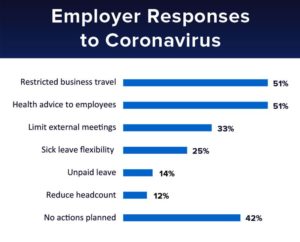
How to become more productive when you work from home during coronavirus epidemic? Fruitful ways to stay productive when working from home during coronavirus epidemic.
Work from home is an option most businesses have started adopting in the ongoing bid to curb the coronavirus outbreak. There are about 115 cases confirmed currently and has been one death in the UK.
Google, JP Morgan and Twitter are some of the large companies released Covid-19 contingency plans to UK-based staff, which include compulsory working from home.
It is believed that keeping employees further apart from each other can reduce the chance of group spread. It also avoids the opportunity for the virus to be caught during a commute or in communal office spaces.
Although the government hasn’t yet advised all businesses to follow suit and adopt remote working, Prime Minister Boris Johnson in his speech on Tuesday has said enforced home working could be an option if the situation worsens.
It isn’t an option for some workers. But what is the best way to maximise productivity for those who might find themselves sent home in the coming weeks? How will they maintain good physical and mental health, and not spend all day in the pyjamas when working from home? Know it below.
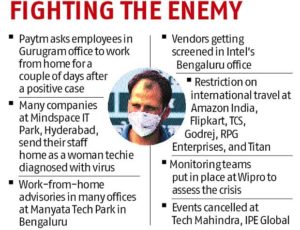
What are the perks of work from home during coronavirus epidemic?
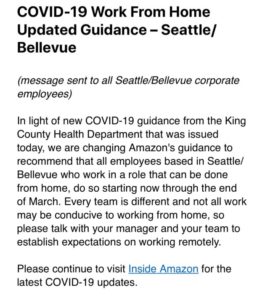
- How to distinguish between work and home mode
One of the significant perks of working from home is slowly moving from bed to the sofa five minutes before you start. It can also be your biggest challenge.
Never forget that you are there to work. So, set yourself up in the right manner. Wake up on time, get dressed and brush your teeth at the start of the day instead of sitting in your pyjamas for eight long hours. So, Switch from home to work mode.
You can do something physically to make yourself ready for the day. Maybe it’s walking around the block, making a special tea, or lighting a candle at your desk. No matter what it is but do it without fail to create a strong association in your mind.
- Be realistic about what you can achieve
Working from home in a wide, open day can feel full of possibilities. One hundred forty-five things on the to-do list? No problem! Don’t fall into the trap of getting over-ambitious. Instead, be realistic and then possibly achieve more than you set out to. Then, you feel satisfied, rather than feeling disappointed you didn’t do everything.
Choose three to five things to do and aim to get the majority done before lunch break. Most people slow down in the mid-afternoon and having a lot in the list will give you the momentum to power through.
- Work in short bursts
When you are in the office, your day is get split by everything from meetings to lunch breaks and even toilet breaks. But when you sat at home on your own with no face-to-face interaction planned it can be easy to work for long, unbroken periods.
When we are in the office, our day is usually broken up with meetings. Although it can be frustrating, they divide the day up and create natural chunks of time. In contrast, the days at home can be very unstructured.
Impose structure on yourself to be more productive. For instance, working in 45-60 minute chunks of focused work followed by a short break. It can be an effective way to break the day up and maintain your concentration levels.
- Don’t forget to take breaks
It can be extremely challenging to tear yourself away from your laptop if you are worried people might think you are slacking off. But that doesn’t mean you should not take breaks. Just because you are feeling comfy at home, it doesn’t mean you don’t need a proper break.
Leave your desk for lunch and take benefit of being at home. You can walk the dog and blow the cobwebs away for half an hour in the afternoon. Then, you will return feeling refreshed and more productive for the rest of the day.
It also includes ensuring you make time to make proper meals and drink water regularly, instead of snacking continuously throughout the day and then crashing in a sugar slump at 3 pm.
- Manage distractions
Being in the office atmosphere gives us a limited number of ways to get distracted. But when you start working at home, you may easily get distracted.
There are plenty of potential distractions when we work from home. So, proactively handle things, which might interrupt your focus.
Keep them limited to do in the short breaks in between the chunks of focused work. As a change of scene, we need to give our brain a break. And it is the perfect time to put a load of washing on or empty the dishwasher.
- Be sociable
Unless you are self-isolating, working from home should not mean that you will not leave the house at all or don’t see your acquaintance for two weeks. Ensure you still keep up social interaction.
If you are a person, who will miss your colleagues when you work from home, build opportunities for socialising into your day. Try to call your colleagues rather than constantly email or Slack messaging.
If you really struggle to apply yourself, try virtual ‘body doubling’. Connect with a colleague via a Skype video call but both work ‘live’ on your project rather than chatting.
End of content
No more pages to load




